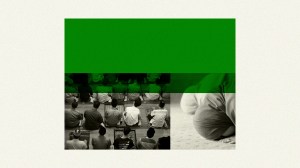In this series

(For the first article in this series, click here.)
Yesterday’s article looked at Ashura, the holiday coming up this weekend, as a way of reporting on Islam’s two major divisions. Today, let’s see what unites devout Muslims, starting with an ironclad monotheism.
Muslims believe in one God, all-powerful and ever present, uncreated, without beginning or end, completely sufficient to himself, and ordaining everything that occurs. The power of Islam moved Arabs and many other people from polytheism, often accompanied by grotesque practices, to monotheism.
Through most of its history, Judaism has emphasized ethnic connections with one particular people. In contrast, Islam has gained about 2 billion adherents—only 15 percent of them Arabs—by welcoming people of every skin color and ethnicity. Muslims say pre-Muhammad prophets of Allah, including Abraham, Moses, and David, were sent to only one nation, but Muhammad is special because he was sent to all people.
Muslims have had their own problems with racial reconciliation, given the history of Arab development of the slave trade, but the Quran, like the Bible, is colorblind. The several million Muslims now living in the United States can trace their ancestry back to many countries of Asia, Africa, and Europe. And admission to Islam is easy: Say “There is only one God, and Muhammad is his prophet,” and you are a Muslim.
Muslims revere the 114 chapters (suras) of the Quran, which in Arabic means “the reading.” Muslims fight shirk, which is any attempt to attribute Allah’s qualities to anyone or anything else. For instance, it is shirk, a sin, to think or say that anyone else can bring rain, satisfy desire, or cause babies to be born. It is shirk to believe that anyone else has godlike knowledge or to seek information from astrologers, palm readers, or the like.
This emphasis makes Islam stand out in opposition to animistic or polytheistic religions that involve many gods or spirits who need to be placated. In Islam, Allah has no subordinates or competitors. He is not our Father in heaven, so we don’t approach him as children. He is our Lord, the master, and as his servants (some Muslims use the word slaves) we are called to obedience, not love. A minority of Muslims, influenced especially by the mystical Sufi trend in Islam, speak of mutual personal affection with the deity.
Humanity’s high place in the universe carried a cost. Suras 15:27, 35:1, 51:56, and 55:15 relate that Islam has two kinds of supernatural creatures: angels (created out of light) and jinn (created out of fire). Muslims say that when Allah created Adam, he commanded the angels, and Satan from among the jinn, to prostrate before Adam as a sign of respect, although not a sign of worship. All except Satan did so. When Allah asked Satan why he disobeyed, Satan replied, “I am better than he is: You created me from fire and him from clay” (Sura 7:12). Allah cursed Satan, who pledged to destroy Adam and his descendants.
But to Muslims, the cost is not too much for us to pay on our own. Christians argue that ever since Adam and Eve’s sin in the Garden of Eden, humans habitually sin. The only way to reverse the curse is through the intervention of the supernatural—the work of God’s grace because of Christ’s sacrifice. However, the Quran states that in the Garden of Eden, Adam and Eve both sinned, then repented, without eternal consequences: “Adam was inspired with words of prayer by his Lord, so He accepted his repentance” (2:37).
That difference with Christianity is literally and metaphorically crucial. Islam has no cross on which Jesus (known as Isa) died for our sins and says we have no need of salvation because we are not dead in our sins. We are naturally able to do what the boss requires. By obeying Allah’s rules, we can get to heaven on our own.
Muslims do not acknowledge original sin and discount biblical passages that show its results. The Bible contains honest reporting about sinful individuals whom God chose not because of their own righteousness but because of his love. Muslims, though, see a record of great heroes that Jews and Christians somehow twisted during centuries of transmission. What for Christians makes the Bible ring true—its record of how Noah got drunk, Lot committed incest, and so on—makes part of it ring false to Muslims.
Muslims express reverence for much of the Bible, but when it and the Quran are in conflict, they go with the Quran. Some become angry about anything that shows God taking a human form. They are not pleased with biblical passages indicating that God walked with Adam in the Garden of Eden, wrestled with Jacob, or came to earth as Jesus in human flesh. Tahrif (meaning “distortion”) is the explanation held by most Muslims that the original biblical texts somehow have been altered or corrupted.
The difference is profound. The Bible emphasizes that God has pity on us and adopts us into his family. The Quran emphasizes that a just master allows us to be his servants but not his children. Chapter 53 of Isaiah describes the most important character in history in this way: “He was despised and rejected by mankind, a man of suffering, and familiar with pain” (v. 3). Muslims respect the rejected Jesus Christ as one of perhaps 124,000 messengers Allah has sent and one of the 25 listed in the Quran.
Yes, Jesus is in the list with Adam, Enoch, Noah, Abraham, Ishmael, Isaac, Lot, Jacob, Joseph, Job, Moses, Aaron, Ezekiel, David, Solomon, Elijah, Elisha, Jonah, Zechariah, John, three others not cited in the Bible, and Muhammad. But Muslims do not believe Jesus was crucified; instead, they hold that he was taken directly to heaven. There is therefore no resurrection. They do not see him as God.
Within Islam, that unbiblical depiction makes logical sense: Without original sin, we do not need a redeemer. Humanity is basically good but mistake prone. Muslims who sincerely repent and submit to Allah have their sins forgiven, with no help from Christ needed (Sura 39:53). Humans, using their intelligence and guidance from the Quran, can distinguish good from evil. Sincerity and good works bring salvation, as Sura 7:8 states: “As for those whose scale will be heavy with good deeds, only they will be successful.”
















